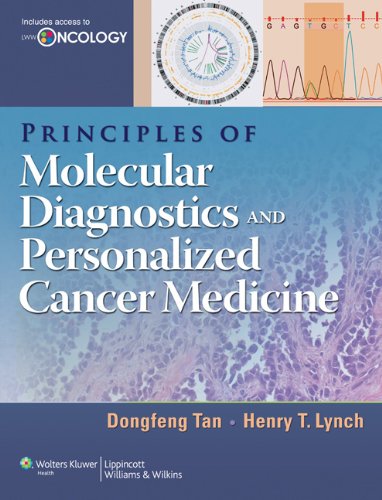Principles of Molecular Diagnostics and Personalized Cancer Medicine 2013
دانلود کتاب پزشکی اصول تشخیص مولکولی و پزشکی سرطان شخصی
| نویسنده |
Henry T. Lynch |
|---|
| تعداد صفحهها |
968 |
|---|---|
| نوع فایل |
|
| حجم |
48 Mb |
| سال انتشار |
2013 |
89,000 تومان
اصول تشخیص مولکولی و پزشکی شخصی سرطان <
نقش ژنتیک مولکولی در درمان تومورهای بدخیم با سرعت شگفت انگیزی در حال رشد است. رویکرد چند رشته ای امروزی به انکولوژی، پیشرفت هایی را در درمان مولکولی هدفمند، پیش آگهی، ارزیابی خطر و پیشگیری گنجانده است – همه اینها تا حدی بر اساس تشخیص مولکولی و تصویربرداری است. در این منبع پیشرفته، خوانندگان دیدگاه های گسترده و جامعی را در مورد روندهای فعلی در تشخیص مولکولی سرطان و پزشکی شخصی سرطان بررسی خواهند کرد. بحثهای معتبر بینشهایی را از کارشناسان مشهور در تحقیقات سرطان، آزمایشهای بالینی، تشخیص مولکولی، درمان شخصی، بیوانفورماتیک و مقررات فدرال به اشتراک میگذارند. از مکانیسمهای اساسی سرطانزایی گرفته تا پیشرفتهترین روشهای غربالگری، مرحلهبندی و درمان مولکولی، خوانندگان بحثهای واضح و سادهای را کشف خواهند کرد که مستقیماً با تشخیص و مراقبت از بیمار مرتبط است.
درک خود را از… بهبود بخشید
• مکانیسم های زمینه ای سرطان زایی – شامل مواد مخصوص تکثیر سلولی، مسیرهای انتقال سیگنال، CSC ها و تعامل بین عوامل ژنتیکی و محیطی.
• آخرین فن آوری مولکولی – از جمله فناوری واکنش زنجیره ای پلیمراز (PCR)، پلی مورفیسم های تک نوکلئوتیدی، سیتوژنتیک سرطان و اپی ژنتیک، ارزیابی کل ژنوم، و توالی یابی نسل بعدی.
• آزمایش مولکولی – شامل غربالگری مولکولی، تشخیص حداقل بیماری باقیمانده، آزمایشات سلولی تومور در گردش، مرحله بندی مولکولی تومور، و ارزیابی تشخیصی سرطان مولکولی.
• تکنیک های تصویربرداری و غربالگری – از جمله تصویربرداری مولکولی، آزمایش ژنتیک، آمار زیستی و بیوانفورماتیک.
• مبنای مولکولی برای درمان – شامل مولکول های حیاتی به عنوان اهداف درمانی خاص، به ویژه ژن ها/DNA، RNA و microRNA ها، پروتئین ها/آنتی بادی ها و نانوذرات.
• تشخیص مولکولی – شامل رویکردهای به روز تشخیص مولکولی برای بدخیمی های شایع و نقش آسیب شناسی در مدیریت هدفمند سرطان.
• درمان هدفمند – از جمله پزشکی شخصی و درمان هدفمند برای بدخیمی های رایج – به علاوه بینش در مورد رویکردهای جدید برای کشف داروی هدفمند و آینده انکولوژی مولکولی!
Principles of Molecular Diagnostics and Personalized Cancer Medicine
The role of molecular genetics in the treatment of malignancy continues to grow at an astonishing rate. Today's subspecialized multidisciplinary approach to oncology has incorporated advances in targeted molecular therapy, prognosis, risk assessment, and prevention—all based at least in part on molecular diagnostics and imaging. Inside this cutting-edge resource, readers will explore broad, comprehensive perspectives on the current trends in molecular diagnosis of cancer and personalized cancer medicine. Authoritative discussions share insights from noted experts in cancer research, clinical trials, molecular diagnostics, personalized therapy, bioinformatics, and federal regulations. From the basic mechanisms of carcinogenesis to the most advanced molecular screening, staging, and treatment technologies, readers will discover clear and straightforward discussions directly relevant to patient diagnosis and care.
Improve your understanding of…
• The basic mechanisms of carcinogenesis—including material on cell proliferation, signal transduction pathways, cancer stem cells, and the interaction between genetics and environmental factors.
• The most current molecular techniques—including polymerase chain reaction (PCR) technique, single nucleotide polymorphisms, cancer cytogenomics and epigenetics, whole-genome assessments, and next- generation sequencing.
• Molecular tests—including molecular screening, minimal residual disease detection, circulating tumor cell tests, molecular tumor staging, and molecular cancer prognosis assessment.
• Imaging and screening technologies—including molecular imaging, genetic tests, biostatistics, and bioinformatics.
• The molecular basis of therapy—including critical molecules as special treatment targets, particularly genes/DNA, RNA, micro RNAs, proteins/antibodies, and nanoparticles.
• Molecular diagnostics – including updated molecular diagnostic approaches to common malignancies and role of pathology in targeted cancer management.
• Targeted treatment – including personalized medicine and targeted therapy for commonly occurring malignancies— plus insights on new approaches to targeted drug discovery and the future of molecular oncology!



